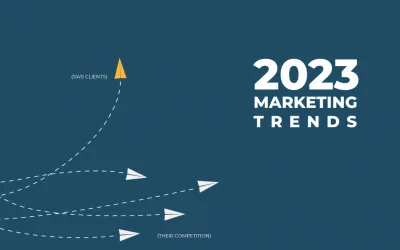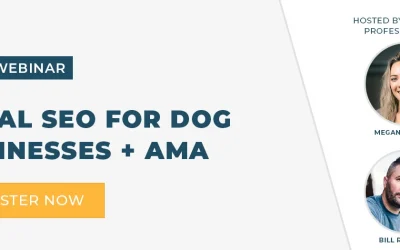What we will cover in this post:
- What is PPC for a dog marketing business?
- The importance of managing PPC for a dog Marketing Business.
- 3 Biggest mistakes you can make with PPC for dog services marketing
- Tips for optimizing your dog business ppc marketing effectively
For starters – What is PPC?
PPC, or Pay-Per-Click, is a form of advertising that allows a business to bid on select keywords for a specific search engine. When a user searches for these keywords, their ad/business appears. With PPC, they are only charged when a searcher clicks the ad.

This is an example of a PPC Ad. These are the top links that appear in a search.
PPC advertising allows bidding on a diverse set of keyword groups that are relevant to a specific business or set of services.
PPC targets “down funnel” or active users. These are users that are actively in the market for your services, and most likely to turn to customers.
The importance of PPC for a Dog Business
PPC is a crucial element for dog businesses looking to market dog daycare or boarding.
Why? It is a proven lead driver to get more leads for Dog Businesses.
A proper PPC strategy can equalize the market. PPC allows:
- Local & individually owned boarding and daycare facilities to compete with large national franchises.
- National franchises can use it to capitalize on brand recognition and multiple location marketing.
Most importantly, the dog services industry and markets are growing tremendously. Standing out will ensure new dog owners find your business first.
How do we optimize PPC campaigns?
Before we can start with optimization, let’s start off with common mistakes that are made when running a PPC campaign. It is important to review the ppc mistakes first, because making these common mistakes can cause you to lose thousands of dollars.
These mistakes can also result in low quality scores. A quality score is a 1-10 designation Google gives your ads. A better quality score will lower your cost per click and also get your ad shown more often.
PPC Mistake #1: Not breaking your ad groups or campaigns into categories
We see this over and over again…
You always want to make sure that your campaigns, ad groups, keyword groups, and ads, are all topic specific.
For example: Don’t mix dog boarding with dog daycare keywords.
You never want a user searching for dog boarding to see your ad for Dog Daycare. This can cause low quality scores and lower conversions.
You want to ensure you are segmenting your campaigns so a person searching for dog boarding sees an ad specific to dog boarding and lands on your dog boarding page.
This leads us to…
PPC Mistake #2: Not using proper landing pages
This is also a mistake that can result in low quality scores for your ads and a decrease in conversions.
Just like not categorizing your campaigns, you also want to ensure that your landing pages are designed based on the searched service.
Two specific examples:
You send all visitors to your home page.
Problem: You are forcing a visitor that is ready to investigate dog boarding to take additional steps to find information on dog boarding. This can lead to high bounce rates and lost conversions.
You send a visitor searching for Dog Daycare to a dog boarding page.
Problem: For the same reasons listed above, you want to ensure that the service being clicked directs visitors to a page relevant to that search.
PPC Mistake #3: Not using negative keywords
Not using Negative keyword lists can cost you thousands of dollars.
A negative keyword is a word or phrase added to your campaign that you don’t want the algorithm to bid on. The two biggest issues that happen when we don’t use negative keywords:
We wasting money on branded searches:
We see thousands of dollars wasted per month from dog businesses that don’t eliminate their brand name from search.
Users searching for a specific brand are going to find that brand. You don’t need to spend money getting people to your website that are looking for you already.
Contact us if you want to learn how to properly optimize around branded search.
Wasting money on non-relevant keywords:
When the bidding algorithm initiates bids, it will do so on what it “feels” is relevant. In some instances, the bidding algorithm is WAAAAY off.
We see countless dollars wasted from a dog daycare facility showing up in searches for animal rescues, animal shelters, or even veterinarians.
So how do we optimize our PPC campaigns?
The tips below are an amazing start when using PPC to market your dog business. Here are 3 great tips to get you started:
PPC Tip #1: Eliminate and segment your branded searches
To avoid wasted money on branded searches, add your brand name to a negative keyword list. This will avoid you bidding on searches for people already looking for your business.
You can also setup your own branded campaign that only bids on your brand name. This will allow you to still capitalize on those searches. It will also drive down your cost per click.
PPC Tip #2: Use phrase match instead of broad match keywords
Using phrase match keywords will allow you to have more control over the key phrases you are bidding on.
Broad match keywords leave the relevancy decisions up to the search algorithms. This is a great way to loose money on non-relevant searches.
Instead of using a broad match for the phrase dog daycare, adding quotes (“dog daycare”) around your keyphrase will ensure that the exact phrase is in your search bids.
PPC Tip #3: Manage regularly
This may seem like broad advice, but management is the key to winning at PPC.
You will want to consistently monitor your campaigns weekly. To help, this is what you should look for:
- Search Terms Report: Are you bidding on keyphrases that are not relevant?
- Conversion rates: Which keyphrases are generating the most conversions?
- Quality Score and Ad Strength: Are your quality scores high and are your ads relevant to searchers?
Optimize, Optimize, Optimize
A well optimized PPC campaign is how you gain advantage over your competition.
Avoiding the mistakes above and utilizing the tips provided will be a great start in marketing your pet business. PPC is a proven way to get more dog daycare and boarding leads.




